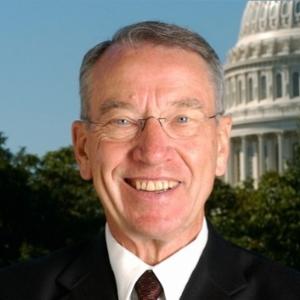The head of the Senate Drug Caucus files a bill targeting imported drug analogs, the toll rises from Sinaloa Cartel factional strife, and more.

DEA Endorses New, Simplified Test to Determine Marijuana's Medical Uses Amid Rescheduling Debate. The Drug Enforcement Administration (DEA) has accepted the legitimacy of a new two-part test to determine whether a substance has accepted medical uses. That two-part analysis was used by the Department of Health and Human Services (DHS) when it made its recommendation to reschedule marijuana.
DEA has traditionally relied on a five-part test to establish whether a substance has "currently accepted medical use." That test required detailed examinations of the drug's chemistry, safety studies, efficacy, expert acceptance, and the availability of scientific evidence.
The new test focuses on two key questions: Do licensed healthcare providers use the substance for medical treatment in legally authorized jurisdictions and is there credible scientific support for a medical condition for which the substance is used?
The DEA has acknowledged that the Justice Department's Office of Legal Counsel (OLC) determined that the five-part test was "impermissibly narrow" and conceded that the two-part analysis was sufficient.
The DEA decision could have an impact beyond marijuana. It could also set a precedent for other drug scheduling decisions, such as those concerning psilocybin. The same new two-part test would be at play there, too.
Drug Policy
Sens. Grassley, Hassan Reintroduce SIMSA Act to Crack Down on Analogues. In a continuation of old-school prohibitionist efforts to repress the drug trade, Senate Drug Caucus Co-Chair Chuck Grassley (R-IA) and caucus member Maggie Hassan (D-DH) on Tuesday led bipartisan colleagues in reintroducing the Stop Importation and Manufacturing of Synthetic Analogues (SIMSA) Act The legislation targets deadly drugs that are substantially similar to already-controlled substances but carefully engineered -- often in China or Mexico -- to slip into the US undetected.
"International drug traffickers are taking advantage of a gap in our laws. This has created a lethal game of 'whack-a-mole.' The SIMSA Act sends an explicit message the US is done playing," Grassley said. "Law enforcement is struggling to keep pace under the inefficient scheduling system we have, and communities are dealing with an unprecedented drug crisis as a result. Our legislation provides much-needed adaptability to get ahead of bad actors and their deadly synthetics."
US law prohibits the unauthorized use of certain controlled substances. However, illicit drug makers and importers circumvent those laws by altering single atoms in controlled substances to create tweaked drugs that are not yet outlawed but have similar effects on users. Currently, uncontrolled substances must undergo a time-consuming analysis before the Drug Enforcement Administration (DEA) can permanently schedule them.
According to a press release from Grassley, the SIMSA Act allows DEA to assign substances as Schedule A if (1) their chemical structure is substantially similar to a controlled substance and (2) they are expected to have the same or greater effect on the human body. The bill subjects individuals who manufacture, export, and import these uncontrolled substances to the criminal penalties associated with Schedule I. It also includes provisions to ensure legitimate research on substances added to Schedule I can continue.
Grassley introduced similar legislation to no avail in 2019 and 2021.
International
Four Arrested in Bali Over Drugs Face Death Penalty. The Indonesian anti-drug chief said Tuesday that four people recently arrested on drug charges on the island of Bali will face the death penalty. They include two Indonesians and two Thai nationals arrested at the Bali airport earlier this month with methamphetamine.
"The drugs would be handed over to two Indonesians who ordered it," said Bali narcotics agency head Rudy Ahmad Sudrajat.
Sudrajat also announced the arrests of two Europeans in July, a Latvian man facing up to 20 years in prison for a pound of hash and two pounds of marijuana and a Swede caught with half a pound of hash who faces 15 years.
Indonesia has some of the world's toughest drug laws. Although it has not executed anyone since 2016 -- when it subjected four drug traffickers to the firing squad -- there are dozens of drug offenders on the country's death row, including a British grandmother caught smuggling cocaine and a Filipino woman caught smuggling heroin.
Mexico Sinaloa Cartel Factional Fight Toll Keeps Climbing. The death toll from continuing clashes between rival factions of the Sinaloa Cartel has risen to 30 after 11 more people were killed in a wave of violence over the weekend, state authorities said Sunday.
That figure includes five men whose bodies were found south of Culiacan, the state capital. That brings the toll to 30 reported dead in a week of clashes across the city and the state.
The infighting is linked to the July kidnapping and delivery to US authorities of cartel leader Ismael "El Mayo" Zambada by Joaquin Guzman Lopez, one of the sons of imprisoned cartel leader Joaquin "El Chapo" Guzman and a leader of the rival "Los Chapitos" cartel faction. The young Guzman also turned himself in to US authorities along with Zambada, undoubtedly in hopes of negotiating favorable treatment for himself and his father in return for giving up Zambada.
The State Department last Thursday issued a security alert for the state because of "reports of car thefts, gunfire, security forces operations, roadblocks, burning vehicles and closed roadways" in the vicinity of Culiacan.
This work by StoptheDrugWar.org is licensed under Creative Commons Attribution-ShareAlike 4.0 International
Add new comment